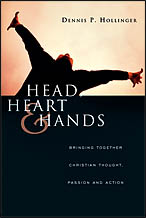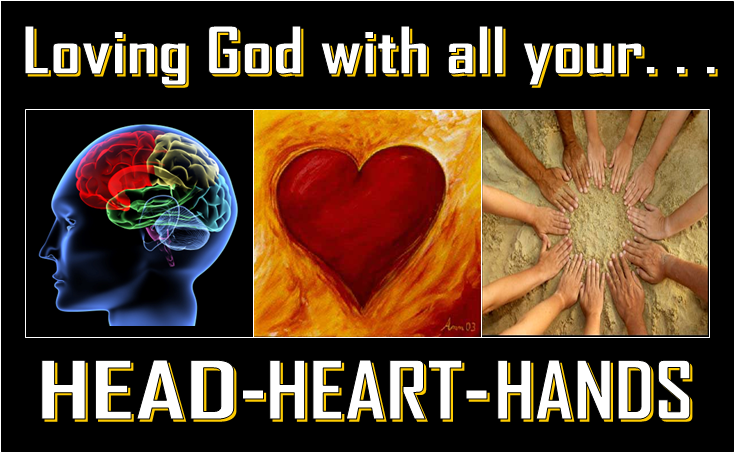
Ever found the “hands” dimension of one’s faith or the faith of the larger Body of Christ distorted?* How does God draw us back to a balanced faith expression of
- head
- heart
- hands?
Distortions
- The overemphasis of the hands
- The sin of self-sufficiency, i.e., What I need I have within. God’s participation through and with me are not necessary.
- Reliance upon our own hands can easily take us away from the reality of God’s grace being the source of our salvation.
- Forgetting Jesus entirely, perhaps even denying the relevance of God’s grace and our need for personal salvation.
- Thanking God for His assistance in my work.
- Worse case scenario: the Christian narcissist.
- Self indulgence with a view only of my actions, my beliefs, my thoughts, my emotions, and my feelings.
- What works (i.e., pragmatism) isn’t what is true or pure in God’s eyes?
- Proclamation that is inconsistent with the Spirit of Christ and the message of the Gospel – an “in your face approach.”
- Dennis Hollinger offers an alternative model. Evangelism should be approached as one beggar who knows where to get food is telling other beggars – we are ALL beggars. What do you think about this perspective, particularly in your campus context?
- Dennis Hollinger offers an alternative model. Evangelism should be approached as one beggar who knows where to get food is telling other beggars – we are ALL beggars. What do you think about this perspective, particularly in your campus context?
- The sin of self-sufficiency, i.e., What I need I have within. God’s participation through and with me are not necessary.
- Neglect of the hands
- Hollinger notes that Christians are comfortable with the notion that “distorted thinking leads to distorted living.” What do you think of the opposite statement in which “distorted living leads to distorted thinking?”
- Not being actively involved in “proclamation” stunts the spiritual growth of a believer as he or she never sees the transformation of a broken life possible through Jesus Christ.
- Our simple inability to offer the act of forgiveness can isolate us from God’s forgiveness and grace.
- We are instructed in the Lord’s prayer to ask for forgiveness as we forgive others.
- In Matthew 18:21-35 we are warned to forgive others through the story of the wicked servant, who, though forgiven by his master of his great debt, refused to forgive his fellow servant of a small debt.
- By not meeting the real needs of real people in the real places God has put us, our faith becomes disembodied. Our faith, at best, is one of the head. Lack of action also leads to an uninvolved heart, a cold heart. The label hypocrite results.
Principles for Healthy Hands
- Knowledge and action go . . . “hand in hand.”
- Colossians 1:9-10:We continually ask God to fill you with the knowledge of his will through all the wisdom and understanding that the Spirit gives, so that you may live a life worthy of the Lord and please him in every way: bearing fruit in every good work, growing in the knowledge of God . . .
- Seeking before God to be in the “right place at the right time.”
- We tend to meander through life without seeking God’s guidance.
- We are encouraged to seek opportunities for presence and proclamation.
- With regards to engaging the world through our words and deeds, how do you feel about the isolation individuals in the Amish community who name Jesus as their Lord? How about those who have belonged to contemplative orders of the Church?
- Action based on a reflection of the love of Christ (a healthy Heart), consistent with a mature understanding of Scripture (a healthy Head) and tested with our fellow believers in fellowship and prayer. It may not be perfect but our intentions are redeemed.
Next in series: Head, Heart and Hands Together: Pandita Ramabai
*Drawn from an adult elective based upon Dennis Hollinger‘s “Head, Heart & Hands: Bringing Together Christian Thought, Passion and Action” (InterVarsity Press, 2005). Kevin Milligan facilitated the class at Elizabethtown Brethren in Christ Church. Note: See the first post in the series for more on the genesis of this study guide as part of a local Emerging Scholars Network partnership (South Central Scholars Network PA FB and Christian Scholar Series).

Tom enjoys daily conversations regarding living out the Biblical Story with his wife Theresa and their four girls, around the block, at Elizabethtown Brethren in Christ Church (where he teaches adult electives and co-leads a small group), among healthcare professionals as the Northeast Regional Director for the Christian Medical & Dental Associations (CMDA), and in higher ed as a volunteer with the Emerging Scholars Network (ESN). For a number of years, the Christian Medical Society / CMDA at Penn State College of Medicine was the hub of his ministry with CMDA. Note: Tom served with InterVarsity Christian Fellowship / USA for 20+ years, including 6+ years as the Associate Director of ESN. He has written for the ESN blog from its launch in August 2008. He has studied Biology (B.S.), Higher Education (M.A.), Spiritual Direction (Certificate), Spiritual Formation (M.A.R.), Ministry to Emerging Generations (D.Min.). To God be the glory!

Leave a Reply